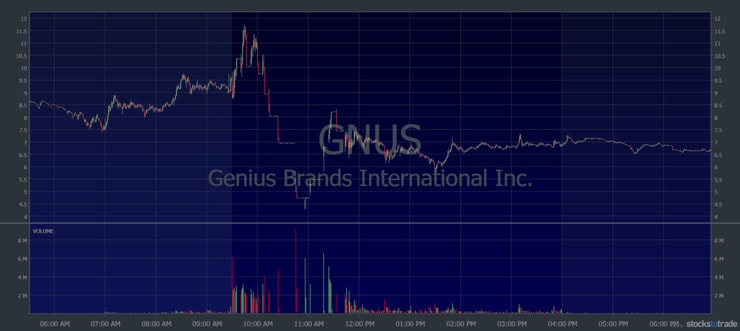If you trade penny stocks, you must know the dangers of diluted shares.
Stock dilution can be common with a lot of these small-cap junk companies.
I see far too many new traders falling for the hype these companies pump out. So they think that penny stocks are too risky to trade. And they can be if you don’t follow the correct rules and understand how these companies operate.
Educate yourself on this now.
Let’s go over penny stock diluted shares and diluted earnings per share. Plus, we’ll look at why companies do it and how dilution can affect stock price.
Table of Contents
- 1 What Are Diluted Shares?
- 2 Example of Diluted Shares
- 3 What Are Undiluted Shares?
- 4 Basic vs. Diluted Shares: What’s the Difference?
- 5 3 Warning Signs of Share Dilution
- 6 Diluted Earnings per Share (EPS)
- 7 How Can You Use Diluted EPS to Analyze a Business?
- 8 Is Dilution Bad for Stocks?
- 9 The Diluted Shares Conclusion
A company’s shares become diluted when it introduces new shares to the market.
Dilution can happen through a stock offering. Or it can happen through the conversion of warrants, stock options, or convertible notes. Dilution increases the number of shares outstanding.
Penny stocks are notorious for stock dilution. Let’s get into why a company would want to dilute its shares …
The main reason a company would dilute its shares is to raise money.
That’s why you see it so often in penny stocks — because they tend to be sketchy companies operating on little to no budget.
They’re small, developmental companies. Some might not even have a product on the market. If there’s no product or sales, there’s no income.
A lot of these companies are usually desperate for cash. They need money to pay bills, make debt payments, pay employees, or further develop their product or technology.
So to generate income they can either take on debt or sell more shares.
A company can dilute shares if its board of directors approves. But there are steps the company has to take before it can create new shares.
It has to file the appropriate paperwork with the U.S. Securities and Exchange Commission (SEC). Then it has to disclose the new stock offering to the existing shareholders. This is usually done through a press release.
Once the directors approve the issuance of new shares, the company can sell more shares into the market or obtain toxic financing in exchange for shares.
Companies can also increase shares outstanding in other ways…
Stock splits and stock dividends are also ways of creating new stock. Instead of selling the new shares to the market, the company parcels them out to existing shareholders. This doesn’t dilute stock ownership, but it still results in a diluted share price.
These moves don’t generate any new capital for the company. They’re looking to attract new investors with a lower stock price. We saw this with the recent Tesla Inc. (NASDAQ: TSLA) and Apple Inc. (NASDAQ: AAPL) stock splits.
Splits and dividends are considered positives because they give value to existing investors.
Yes, share dilution is legal as long as the company files the correct disclosures.
But that doesn’t mean it isn’t shady. Penny stocks run in a cycle of stock dilution and reverse splits.
A company will announce some promising news, get its share price up, then do an offering of more shares. Eventually, the price goes back down and traders forget about the stock. Then the company will do a reverse split, which reduces the stock float and increases the share price.
Then they start the cycle all over again…
Think of the company as a pie. Say you cut a pie into four pieces to split among four people. Each gets a quarter of the pie. But then four more uninvited guests show up and want some pie too…
So you cut the four pieces in half so all eight people can have a piece. But everyone gets a smaller slice because the pie didn’t get any bigger.
It’s the same concept with diluted shares.
When the number of shares for the company increases, the value of each share goes down, and so do the earnings per share. This can cause a lot of investors to sell their positions.
So I’m talking a lot about penny stock dilution, but larger companies can dilute their shares, too. With penny stocks, prepared traders know to expect the worst, so offerings aren’t always surprising.
But with larger companies, it doesn’t happen as often — and can it signal big trouble.
The pandemic crash put a lot of companies in trouble, especially airlines and cruise lines.
Carnival Corp. (NYSE: CCL), United Airlines Holdings Inc. (NASDAQ: UAL), and Royal Caribbean Group (NYSE: RCL) all had offerings this year as they struggled to make money.
Penny stocks typically have a bigger reaction to dilution because they’re so volatile. The whole market in 2020 has been extremely volatile. Check out my “Volatility Survival Guide” for tips on how to survive it and prepare for future volatility.
Let’s look at a penny stock chart after a company announces an offering…
In May 2020, this stock had huge volume, as it ran up from under $1 to almost $12. On June 4, the company announced a stock offering of 60 million shares at a price of $2 per share.

You can see it got halted multiple times as it crashed from the $11s to the $4s. Imagine if you weren’t at your computer that day to exit your position…
Find out which stocks I’m watching each week — delivered right to your inbox. Subscribe for my no-cost weekly stock watchlist here.
When investors talk about undiluted shares, they’re talking about undiluted earnings per share.
It’s a way of calculating earnings per share without accounting for possible future dilution from convertible notes, warrants, or restricted shares.
With this calculation, you get the best-case scenario for earnings per share, and it can make a company look better than it is. Especially if it has anything outstanding that can be converted into common stock in the future.
Calculating fully diluted shares gives you the worst-case scenario for a stock’s earnings per share.
Diluted earnings per share include any convertible notes, stock options, and warrants, and anything convertible into common stock.
But basic shares are the outstanding shares held by all shareholders at the time of calculation. Not accounting for possible future dilution. Similar to the undiluted share calculation.
It can give you a completely different picture of how the company is doing, compared to calculating the fully diluted earnings per share price.
Fundamentals don’t really matter to me, because most penny stocks don’t have any. I expect the worst out of every stock and every company.
My trading strategy doesn’t include researching earnings per share. I don’t hold my shares long enough to care.
Instead, I trade patterns based on catalysts, volume, chart patterns, and technical analysis. And it’s made me over $6 million in the market.*
(*Please note that these kinds of trading results are not typical. Most traders lose money. It takes years of dedication, hard work, and discipline to learn how to trade, and individual results will vary. Trading is inherently risky. Before making any trades, remember to do your due diligence and never risk more than you can afford to lose.)
I also have multiple millionaire students from the strategies I teach in my Trading Challenge*.
To get started learning my strategies, get “The Complete Penny Stock Course” book. My student Jamil put all my lessons together into this one resource.

Let’s cover some basic warning signs that might mean a company is about to issue more stock…
Debt
Most companies have debt, penny stock companies especially. That’s not always a bad thing…
But when a company has more debt than income, that can create a problem. If there’s not enough money to go around for regular operating expenses, plus debt payments, then the company needs to generate cash.
If they don’t have a way to increase sales or reduce other expenses, they often look at selling more shares.
Company Growth
Penny stock companies often put out positive press releases about a new product they’re developing or a study that had positive results. Sounds exciting, right? The company’s growing and expanding…
Not so fast. These are developmental companies. The new product, research, or expansion usually amounts to nothing. We’re not talking about Apple or another blue-chip stock expanding…
We’re talking about sketchy companies that put out positive press releases to raise their stock price. Then they sell more shares into the hype.
Don’t get sucked into the hype. Never believe that the money from an offering will make the company worth more in the long run.
Huge Price Increases
With penny stocks, as soon as there’s a huge increase in the stock price, dilution is always possible. A big jump in a stock price could be because someone’s pumping and promoting the stock.
A company might promote its stock ahead of an offering, or they might have outstanding warrants or convertible notes to dump on retail investors.
When you see a penny stock up 100% or more in the premarket, check the SEC filings for possible dilution. It’s part of your due diligence.
I made a DVD with my millionaire student Micheal Goode called “How to Read SEC Filings.” It’s not the most exciting video you’ll ever watch, but it’s important information. This information can help you avoid big losses. Study up!

With large-cap stocks and conventional investing, earnings per share is a common way that investors calculate the value of a company’s shares. If a company can raise its earnings per share, it generally increases the value of the company and the share price.
But the number of shares outstanding affects the calculation. There are only so many earnings (or so much pie) to go around. If the number of shares increases, the earnings per share (or size of your slice of the pie) goes down.
Calculating diluted earnings per share takes into account all outstanding shares, plus any warrants, convertible notes, or stock options that can be converted into common stock in the future.
Share dilution almost always results in a drop in the share price. There are a few reasons for that…
- Short sellers. If there’s bad news released, short sellers are there to ride the stock price down.
- Supply and demand. Dilution creates more supply. It takes a lot more volume (or demand) to move a higher-float stock’s price up.
- Change in value. Current investors sell out because the shares aren’t worth as much as they were before they were diluted.
Combine all those factors and you get lower share prices.
To make things worse, an offering is usually at a price lower than the market value of the stock. That means all the people who bought above the offering price just overpaid.
Even if the offering is done at the market price, the price will still usually go down.
The diluted earnings per share (EPS) calculation looks like this:
Diluted EPS = Net Income – Preferred Stock Dividends / Average Outstanding Shares – Dilutive Shares
If a company has dilution, the diluted EPS calculation will equal less per share than a basic EPS calculation.
How Can You Use Diluted EPS to Analyze a Business?
Diluted earnings per share can give investors an idea of what the price per share should be if all possible outstanding shares hit the market.
It’s like knowing the worst-case scenario of your investment. If a stock is trading to high, you can wait for a dip to enter. Anything that can give you an edge in the market can help your trading or investing.
Is Dilution Bad for Stocks?

With penny stocks, dilution is definitely bad for the price of the stock. You’ll likely see a huge sell-off and a decline in prices.
But with large-cap stocks, investors have a bit more trust in the company. They could look at secondary offerings as a good thing in the long run. The company can raise more money and restructure itself without taking on any more debt.
But some investors will look at it as a loss of value.
This is why I say trading isn’t an exact science. It all depends on investor sentiment and their perspective of what’s considered good or bad.
Diluted shares can signal trouble in penny stock land. Be cautious if a company announces offerings, warrants, or convertible notes, or if insiders are selling.
Dilution usually causes a steep drop in share prices. And short sellers can add to the selling pressure.
Always expect the worst out of every penny stock company. They generally don’t care about shareholders. They care more about raising money to continue their pump schemes.
But that’s OK with me and my students. Because we know how to take advantage of these kinds of shady company moves. They can actually be quite predictable once you learn the patterns.

Learn how we do it. Apply for my Trading Challenge to access all my educational resources and a killer chat room. But don’t apply if you’re lazy and want to get rich quick. That’s not what I teach.
I give people education, tools, and resources to help them become self-sufficient traders.
Have you been affected by diluted shares when in a trade? Tell me about it in the comments. I’d love to hear about it…






Leave a reply